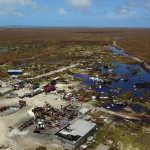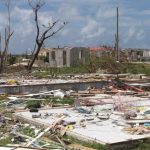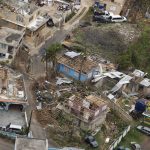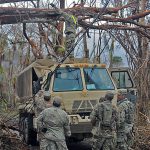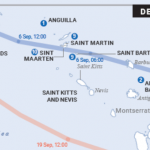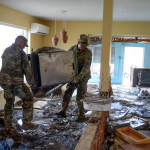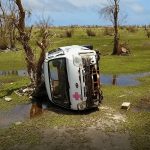With the Caribbean in tatters, it’s time to talk climate change resilience

by His Excellency Gaston Alphonso Browne, Prime Minister and Minister of Finance and Corporate Governance of Antigua and Barbuda
From Talk Media News
“Wake” is a weekly foreign policy broadcast produced by Talk Media News and hosted by Luke Vargas from U.N. Headquarters in New York.
The following is a complete transcript of Episode 21, “Natural Disasters and Climate Resilience.”
Subscribe to weekly episodes of “Wake” on iTunes or Google Play, and follow the broadcast on Twitter @WakeOnAir.
From Hurricanes Irma to Jose to Maria, an active Atlantic storm season has ravaged wide swaths of the Caribbean.
The storms themselves receive wall-to-wall media coverage, but when they pass, the story of reconstruction quickly drops from the front page, and post-storm assessments become the stuff of academics and city planners, not the public at large.
And yet, climate scientists tell us the storms will get worse. Should we be using natural disasters as an entry point into a discussion about climate change and adaptation?
We’re taking on those questions next, on Wake.
Thanks for joining us, we’re coming to you today from U.N. headquarters in New York.
We’ve got a lot to cover as we explore the linkages between natural disasters and climate change, so let’s get right to our guest.
In studio with me at the United Nations is Gaston Browne, Prime Minister of Antigua and Barbuda. Prime Minister, thank you for being with us and welcome to Wake.
Gaston Browne: Thank you.
Luke Vargas: Your country sustained a direct hit from Hurricane Irma. And it’s now been affected by Hurricane Maria also. This is just a pattern of storms hitting the Eastern Caribbean. You were just on the islands. Can you describe for our listeners the situation that you are seeing there now.
Gaston Browne: Well first of all, let me explain that Antigua escaped unscathed. So it is business as usual in Antigua, which is the larger of the two islands, and that is the island that really generates most of the revenue for the twin-island state.
So I want to make it abundantly clear that Antigua is open for business. It is business as usual. Unfortunately, our sister island Barbuda, which is approximately 30 miles north of us, was totally decimated by Hurricane Irma.
You may recognize that Irma is easily the most ferocious hurricane to have stormed its way through the Caribbean. And it was very unfortunate that Barbuda was in its way. I mean, we had storm force or hurricane force winds in excess of 230 miles per hour.
Now, any country that would have experienced that level of wind, that force clearly would have had immense damage. I mean, we have seen for example, storms of lesser size and magnitude and power creating significant damage in the U.S., so you can imagine a small island, a flat island without any hills to create a barrier for the winds, sustaining hurricane force winds up to 230 miles per hour [there] is no way Barbuda would not have suffered immense damage.
Well unfortunately, 95 percent of the properties on the island were damaged or demolished. There were some properties that were just completely demolished. All of the public institutions were damaged and are now non-functional.
We also have a situation in which the entire utilities and telecommunications infrastructure was destroyed. There is no running water on the island. The island, in essence, is just a manger wreck, and presently it is uninhabitable.
We believe that within the next probably three weeks we can start to systematically move people back onto the island. As we seek to rebuild, five percent of the homes are salvageable, so we will certainly rebuild those homes. And there are some, too, that are damaged that we refer to as tier-two properties that we should be able to repair as well.
So the whole idea is to get the Barbudans as soon as practical but not expose them to any potential for risk of disease.
Luke Vargas: These hurricanes as they pass through the Caribbean receive a lot of attention here in the United States in the media. But as I watched that coverage it became very clear to me that in many ways the United States is fortunate. We are 1,500 miles further West than your country. We have more time to prepare, more places to go.
As someone who is responsible for the safety of your people and your island being there just sort of on the front line of these storms. Is that a responsibility that weighs on you?
Gaston Browne: Well it does. And luckily for us, prior to Irma, myself personally and other officials on Antigua had warned the residents. We’d asked them to batten down and take all the necessary precautions to secure property, to secure their valuables and more importantly, to secure lives. And I have to say that if they had not heeded the warnings of the authorities, the amount of fatalities would have been more.
You’d recognize that even though Barbuda was totally decimated, we had only one fatality, and I think it is partially as a result of the extent of the preparedness.
We do not have the options that you have here in terms of moving to other states, but in terms of ensuring that properties are properly secured, and to clean drains and so on, to remove let’s say branches, hanging branches, over the electric wires and so on. Those are things we do routinely and I can say that we were certainly in a state of preparedness.
Antigua had gusts up to about 70 miles per hour, but we were so well-prepared that the damage was minimal. So there is significant resilience, certainty in the case of Antigua. We had the unfortunate situation back in 1995, in which we were struck by Hurricane Luis, and since then the building code has been made robust so that the properties are more climate resilient.
I have to admit that rebuilding primarily for storms between 150 to 200 miles per hour, but Hurricane Irma has actually brought to the fore a new reality of storms now which have gusts have in excess of 230 miles per hour, which means that we will have to step up, especially in Barbuda, based on the extent of the destruction in Barbuda.
We have to now ensure that the building code in Barbuda is even more robust than Antigua, and perhaps any other country within the Caribbean, because the island is so flat that the extent of climate resilience has to be greater.
So for example, I’m of the view that wooden properties are not for Barbuda. They should be invariably concrete properties and possibly with concrete roofs. They have to be built several feet above the ground at least, to ensure there is no or little flooding. There are certainly steps that have to be taken in order to increase the resilience of Barbuda going forward.
Luke Vargas: Within your government I’m sure there are conversations – as you just alluded to – about how to protect your island from a changing climate. Is the thinking within your government that these storms are going to be more frequent and more severe?
Well clearly, these are consequences of climate change, and if the industrialized countries continue to be profligate in the use of fossil fuels, I believe that these storms will become even more ferocious. And clearly the frequency will also increase.
So it means that countries in the Caribbean will become far more vulnerable. So that is why we need to build the capacity so that we have more resilient buildings, more resilient infrastructure. Failing which, we will just suffer from repeat damage and will have to be constantly raising resources to fix damage and infrastructure and institutions.
We’ve had a very vexing issue with the international community in that all countries in the Caribbean are considered to be middle-income countries and generally are precluded from developmental finance and concessional loans. So that in itself places us at a disadvantaged, because many of our countries have had to borrow at commercial rates in order to rebuild. So we have been making the call for this – you’d probably refer to this as a ridiculous criteria, a clearly flawed criterion of capital income – to be removed.
And especially in the case of disaster, I can’t see how you can have the level of carnage that exists in the Caribbean today and wealthy countries are saying they cannot assist because you have some artificial criterion in capital income that precludes them from assisting. That is not in keeping with the type of human cooperation that is required, especially considering that we all have a common humanity.
We all live on a shared space called planet earth. And we definitely need to ensure that there is cooperation at all levels, in all hemispheres, in all regions and global cooperation in order to have a better world.
Luke Vargas: Finally, Mr. Prime Minister, I know your nation is still dealing with the immediate aftermath of these storms, and it will be difficult plain and simple to find money for a rebuilding effort. But as you look toward that, is the plan to rebuild as much as possible as quickly as possible, or is a storm like this a moment, an opportunity to begin to re-imagine and re-engineer your country for the future? Is this something you think this is an opportunity to discuss?
Gaston Browne: Absolutely. Both. Clearly it’s an opportunity to recalibrate the way we do things, to ensure that going forward that we build a climate-resilient and certainly a green Barbuda.
The intent now is to ensure that Barbuda becomes a totally green island and we have made significant progress in that regard. We’ve had a grant of a few million dollars, so far, from the U.A.E., and I’m pretty sure that this is one such opportunity that we’ll be able to exploit and to implement to ensure that we have a green Barbuda, one in which we will reduce our carbon footprint, and one in which we will build a more resilient Barbuda going forward.
And clearly the opportunities to build a more resilient infrastructure, to probably put the electric lines underground, to have concrete homes, possibly homes that are built on pylons that go into the bedrock, properties that are elevated maybe two, three feet above the ground and properties that at the same time may have concrete roofs so we can sustain stronger winds, which will evidently be the norm unless we get greater responsibility from the developed countries, unless they will take responsibility to reduce their carbon footprint, to understand that ultimately their profligate use of fossil fuel is actually hurting other countries.
And the irony about it is, not only you may have a few of these states in denial, but they do not help with the rebuilding and they find all sorts of reasons and impediments for why they might not assist. That is not keeping in the spirit of human cooperation. And ultimately we are seeking a better world – one in which all peoples can benefit equitably from the resources of the earth, and one in which all of the people’s will enjoy good living standards. We cannot have the type of inequity which exists today, in which some countries control the greater or the majority of the resources of the planet and at the same time are refusing to share. They have an obligation to share.
The reality is they did not create the oil, the gold, the diamonds, et cetera. They happen to have custody of them, but they must share. And this is not a situation in which we are begging. We are not here with a begging bowl asking the United States to support us on a begging basis. We intend to work for what we need and what we want.
But at the same time, they have to understand that we have certain vulnerabilities and that we need a level playing field. Just as the United States and other developed countries can borrow on the capital markets at three percent, we must have a similar opportunity.
You cannot force a small island state into a situation whereby even in a humanitarian disaster they have to borrow at 10 percent. There’s just something grossly inequitable about that. There’s absolutely no justice in that type of behavior. And one of the opportunities is for us to advocate for a recalibration of the whole global financial architecture and to carve out a space for small island states.
Luke Vargas: Prime Minister Gaston Browne of Antigua and Barbuda, thank you so much for being with us today and best of luck to you and to your country.
Gaston Browne: Thank you.
*********
Luke Vargas: We’re looking this week at natural disasters and climate change adaptation, trying to figure out when exactly we’re going to talk about the latter, instead of just focusing on the former.
Rachel Cleetus is the lead economist and climate policy manager at the Union of Concerned Scientists.
Rachel, thanks so much for being with us and welcome to Wake.
Rachel Cleetus: Thank you very much for having me.
Luke Vargas: Rachel, you listened to the interview just a moment ago with Prime Minister Gaston Browne of Antigua and Barbuda, in which we shifted pretty quickly from disaster response to climate change adaptation. That is a transition that I don’t feel like I hear much in the U.S. media. Do you think the segue between topics to be an appropriate or necessary one?
Rachel Cleetus: Well, as you said and as Prime Minister Browne said, this has been a terrible hurricane season for the Caribbean and the Gulf and the Southeast of the U.S.
We’ve seen three record storms back to back – Harvey, Irma, now Maria hitting Puerto Rico in a devastating way – and so moments like this, obviously the immediate attention is on disaster relief, getting people to safety, making sure their emergency needs are met, but it would be irresponsible not to talk about, what are the things we could have done better going into the storm in terms of preparedness and understanding what the underlying causes are that are making these storms worse.
And there are many contributing factors, but there is no doubt that climate change is contributing to greater risks of these very intense storms and, as well, the heavy rainfall that’s accompanying them. So understanding those climate factors is a very important part of the discussion right now, alongside the longer-term, how do we rebuild stronger and safer?
Luke Vargas: Rachel, the prime minister listed some ways Antigua and Barbuda might rebuild to be resilient to future storms. These were concrete homes, concrete roofs, pylons going down into the bedrock, putting electric wires underground.
What do you make of these sorts of reconstruction strategies? And were more money available to him, what are some further steps you’d recommend?
Rachel Cleetus: Well there’s no doubt that those are common-sense measures that can be taken, the hardening type of measures to make sure that infrastructure that people depend on is better protected going forward. But as you heard clearly during the interview, there’s no doubt that rising carbon emissions are contributing to worsening climate change and he made the point repeatedly that wealthier nations that have a greater responsibility for these rising carbon emissions really need to address the underlying causes as well, even as we’re doing these measures to rebuild back safer.
I will say that one of the very important things that we can do is make sure that as we’re investing in these types of very expensive and important measures going forward, that we’re doing it in light of the growing risks.
So, we know that around the world, including here in the U.S., we have a lot of people located in places that are at great risk of floods and sea-level rise, and we need to be asking these questions: does it make sense to rebuild, business as usual, as we were before?
Luke Vargas: Rachel, the Prime Minister said Antigua and Barbuda can’t finance adaptation to climate change, that the country as very much at risk, but it’s classified as middle income and can’t get these special, low interest loans.
If that’s right, it sounds like the international financial system simply isn’t geared toward global rebuilding and retrofitting of the sort that is needed now and will increasingly be needed now and will continue to be needed in the future –
Rachel Cleetus: Well, what he described is actually a global challenge and it’s a challenge here in the U.S., because these kind of disasters really bring into relief the inequities that already exist in our current economic and financial systems. So here in the U.S. we have communities in Houston, in Louisiana, in parts of Florida – less well-off folks who are being hit particularly hard by these hurricanes – and don’t have the means and wherewithal to get back on their feet without some type of assistance.
And we’ve seen with previous disasters like Katrina that often times those serious impacts linger for many, many years and many of those people had to leave New Orleans, weren’t able to find jobs or rebuild their homes where they were. So the equity challenge related to these disasters is real, it’s significant, and we’ve got to do better.
Luke Vargas: You’ve shifted us nicely to the United States. As we look to the federal side of the equation, what can Washington do to modify its disaster response and disaster prevention programs so that they will in the future factor in climate change and, after a disaster, promote resilient reconstruction?
Rachel Cleetus: Well, the first thing to recognize is that our ability to limit harms from these types of disasters begins way before the disaster hits. It’s the money we spend before on preparedness and making sure we’ve got the resources to communities ahead of time that really matters when the disaster hits.
It’s why we’re seeing a place like Florida, where the power outages are severe, but power is coming back, versus a place like Puerto Rico where, because of under-investment in the power infrastructure, people are saying it could take months in some cases to get power back.
So preparedness – and that money comes from agencies like FEMA and HUD – those dollars need to flow to communities that are on the front lines of these disaster-prone areas.
The other thing that we need to do is make sure that as we’re rebuilding and recovering, that we’re building to more resilient standards. So in the U.S. here we have something called the Federal Flood Risk Management Standards, that was recently updated and then was rolled back by the Trump administration.
Something like that is really critical to making sure that as we rebuild, we’re building in a more resilient way.
And then we also have to make sure that as we go forward, we’re giving people options so that, if they’re in a very high-risk area, they have a way of maybe retreating to a lower-risk place. So options like home buyout programs that would allow people to recoup some of their investment but leave places that are very high-risk. We’ve got to start thinking about this in a more holistic, systematic way.
Luke Vargas: Rachel, I don’t think it’s a stretch to say that President Trump’s decision to pull out the Paris Agreement really signaled a lack of interest in trying to stop climate change. But from another angle, Trump owns real estate, says he wants to run government like a business – does that not create a possible point of leverage to argue that climate change adaptation is simply good business?
Rachel Cleetus: The reality here is we have had a terrible disaster season this year – these hurricanes, the wildfires. This is adding up to billions of dollars of cost, economic costs, let alone all the other costs to people – the health, the mental anguish, etc. – so any government that’s responsible needs to recognize that these are real concerns, these are not simply environmental concerns. This is of prime economic significance for our country that we take on these growing risks from climate change.
So yes, the real estate lens is one of them. But there are many other things that we need to be thinking about.
We have a lot of people now suffering from the harms of these disasters. Where are they going to get help? And how are they going to rebuild their lives? And how are we going to make sure that this happens in an equitable way so that those who are politically and economically disempowered don’t get left behind?
We very much hope and need the president to take these issues seriously.
Luke Vargas: Rachel Cleetus is the lead economist and climate policy manager at the Union of Concerned Scientists. Rachel, thanks so much for being with us.
Rachel Cleetus: Thank you very much for having me.
Luke Vargas: I’m Luke Vargas, signing off. Join us again next week on Wake.
IMAGES:
An estimated 95 percent of structures on the island of Barbuda were destroyed or damaged by Hurricane Irma. Courtesy: ShelterBoxAn estimated 95 percent of structures on the island of Barbuda were destroyed or damaged by Hurricane Irma. Courtesy: ShelterBox
Members of the Florida National Guard clear furniture from a home in Big Pine Key, Florida that was severely damaged by Hurricane Irma. Courtesy: U.S. Army Corps of Engineers
Soldiers with the Puerto Rican National Guard work to clear power lines downed by Hurricane Maria. Courtesy: Puerto Rico Army National Guard/Staff Sgt. Wilma Orozco Fanfan, 113th MPAD
An aerial view of houses in Puerto Rico without roofs due to the strong winds brought on by Hurricane Maria. Courtesy: Yuisa Rios/FEMA
Gaston Browne, Prime Minister of Antigua and Barbuda, addresses the U.N. General Assembly. September 21, 2017. UN Photo/Cia Pak
An overturned ambulance on the island of Barbuda. Courtesy: Pan American Health Organization
An aerial view of destruction to the island of Barbuda caused by Hurricane Irma. Courtesy: Pan American Health Organization
Prime Minister Gaston Browne of Antigua and Barbuda is interviewed by Talk Media News’ Luke Vargas at the United Nations.
For more on this story go to: http://www.talkmedianews.com/wake/2017/10/02/54526/

